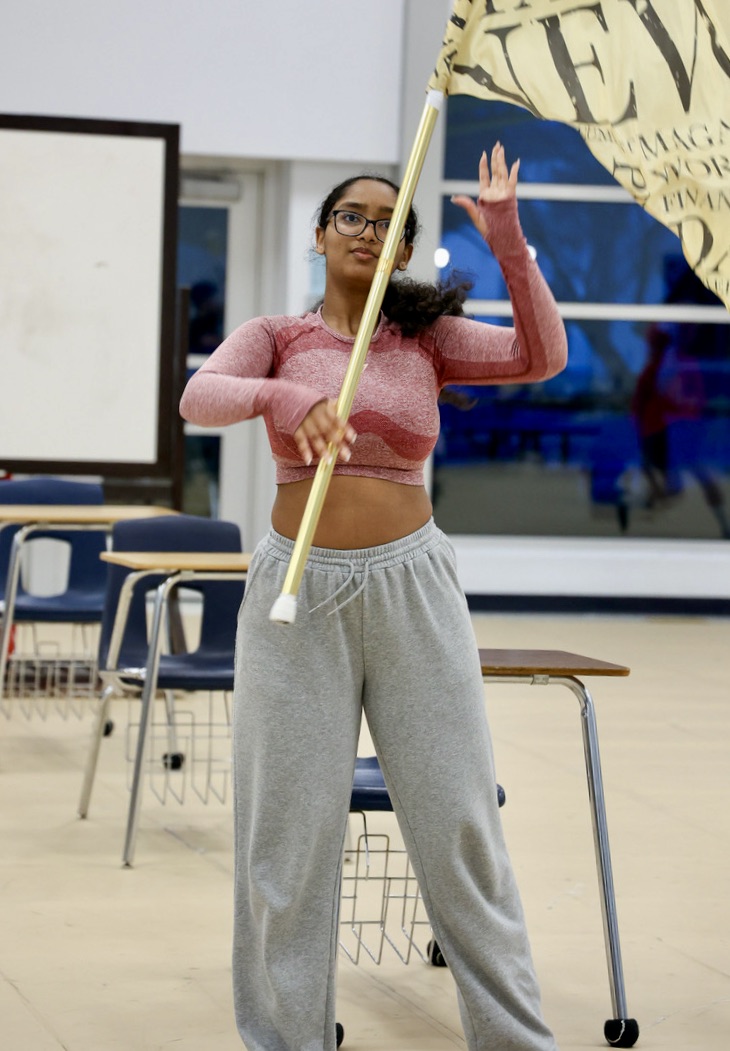As sports have progressed over the years, many activities have turned to being considered as sports because of the physical challenges and the stamina needed to partake in them. Some sports have gained more recognition while others are considered simply a passion.
Participating in theater and dance growing up, SCHS color guard coach Kimberly Vernon has noticed that traditional sports are much more accepted than unconventional sports, such as dance and basketball.
“I would think of it (a sport) as something active and something that is competitive, and both of those things are what I would use to describe color guard,” Vernon said.
Noticing the differences between arts and sports, Vernon feels that color guard is in the middle, having similarities with both activities.
“They’re slogan (color guard’s) is ‘sport of the arts’ because to me, yes, we are athletic and yes, we are doing things that get our heart rate up and get our cardio going and that keep us in shape,” Vernon said. “Color guard is a lot about artistry, so creating something that connects to music. I think the title ‘sport of the arts’ is honestly the best way to go because we are athletes, but we are also artists.”
Similar to color guard, dance is an activity that requires physical and mental practice. According to Vernon, although dance does not include a field or court, the amount of practice and hard work put in by dancers are similar to any other sport.
Vernon believes that practice is key and that the same way players practice runs or plays, dancers have to practice steps and coordination.
“Before you can start doing these beautiful dance choreography pieces, you have to learn how to do a plié, and then you have to learn how to do a leap, and then you can put all these different skills together,” Vernon said.
Sophomore Laasya Pandravada believes that along with the skills that need to be mastered before a performance, syncing with the rest of the dancers and music is a large part of daily practices.
“In dance, we have competitions and we compete against other teams, so in that sense, it is a sport and it is competitive,” Pandravada said. “One aspect in dance that is not as prominent in other sports is coordination, and this is key for a good performance. It takes many weeks to achieve this, to align with each other, the music and the beats.”
Pandravada notices that she and other dancers, despite the time and effort they put into dance, are seen as inferior to more conventional sports, such as basketball, soccer or football.
“I feel that I spend lots of time dancing and it takes lots of strength, agility and stamina, and when someone says that it’s not hard, it’s not fair because it really is hard to do and hard to master,” Pandravada said.
Sports and activities such as cheerleading and dance are not competitive at school games, but there are competitions outside of school. Vernon believes there is more to any athlete than what is seen at school or at one competition.
“A lot of people haven’t been to a color guard competition. A lot of people haven’t been to cheer competitions, so they haven’t seen their true athletic environments,” Vernon said.
Agreeing with Vernon, Pandravada believes that cheerleaders should receive more praise for their hard work and dedication that goes unseen at times.
“Cheering for other sports such as football and basketball brings exposure to cheerleading, but I think they should also have competitions and showcases for themselves too that are publicized to the school or other groups,” Pandravada said. “Cheerleaders are very athletic and mentally tough. They work really hard to be able to compete in those kinds of sports, so I think they deserve more recognition and more support.”
Vernon believes teammates can advocate for their own team and spread awareness of their sport in their own communities.
“I would always encourage my friends or teachers to promote outside activities or our outside productions,” Vernon said. “I would always ask my teachers if they could make it extra credit if someone would come and watch our shows.”
Along with encouraging others to come to events, senior Javeria Ahmed believes that having activities at the event itself will help the audience be engaged and want to stay.
“If you have a snack bar or you have activities in the middle, just like football games do, then people would enjoy it much more,” Ahmed said. “Once more people start coming, it gets more out there and people talk about it more. If you get that initial wave of people coming, it would be much better.”
Pandravada also admitted that by teaching others about one’s sport or activity, teams can gain more acknowledgement.
“I think telling those around them, whether it be friends or family or teachers, the more people that know the better. I think that reaching out to different groups of people and sharing your talents can help you and your team receive more respect,” Pandravada said.
Ahmed mentioned that athletes should not focus on what other people think of their sport and focus more on the enjoyment they receive from taking part in that activity.
“It doesn’t really matter that much because as long as you enjoy the sport that you play, it’s not that big of a deal,” Ahmed said.
Sometimes the reason a sport is undermined is because of the lack of knowledge people have. Vernon mentioned that for her color guard team, promoting and publicizing events and shows helped more people learn about who they are as a team.
“You don’t know what you don’t know,” Vernon said. “A lot of people may not even know what color guard is and know how to support it, so I think as members, it is also important to advocate for your own group because the more people learn the more that they care.”


